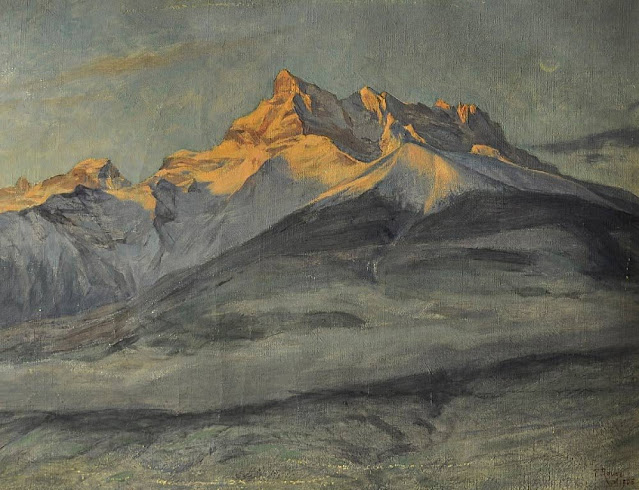
The painter
Frederic Rouge
was born in Aigle (Switzerland), on 27 April 1867. His parents owned a
small shoe factory. After school, he attended the Fine Arts College in
Basel for a year, coming first of his class at the end of the course.
Then, after a while studying with the history painter Vigier, he came
back home to live with his parents. To perfect his technique, the artist
spent three consecutive winters at the Julian Academy in Paris "where
Professor Boulanger, exacting and irascible, was hard to please". In
1903, Frederic Rouge settled in Ollon, not far from Aigle, in a pleasant
house called "The Cedars". Today Ollon is still a large village
surrounded by orchards and vineyards bathed in sunshine, its dense
forests teeming with wildlife, and where the Alpine scenery reigns
supreme.
He wholeheartedly loved this region which provided him
with so many subjects of inspiration, and whose every season, scene and
mood he rendered so faithfully.
Frederic Rouge was suffering from
paralysis when he died on 13 February 1950. All his life he had remained
unassuming, an honest man and a great artist, true to his ideals, a
citizen devoted to the cause of liberty - perhaps not the best way to
make one's fortune, even for a painter of talent !
The mountains
The Dents du Midi (Teeth
of the south) (3,114 m to 3,257 m -10,216 ft to10,685 ft) are mountain
range, 3 kilometers long, located in the Chablais Alps in the canton of
Valais in Switzerland. Overlooking the valley of Illiez and Rhône
Valley on south, they face the lake Salanfe, an artificial reservoir,
and are part of the geological whole massif Giffre.
The name "Dents
du Midi" is recent. The people formerly called them "Dents Tsallen". It
was only towards the end of the19e century that the name "Dents du
Midi" came officially.
Each « tooth » had several names over the centuries and according to its geological evolution.
- The "Cime de l'Est" (3,178 meters) called "Mont Novierre" before the
mid-17th century, and "Mont Saint-Michel "after landslides in 1635 and
1636 and finally "Dent Noire" (until the 19th century).
- The "Dent Jaune" (3,186 m) was called the "Dent Rouge" until 1879.
- The "Doigt de Champéry" (in 1882) and then the Doigt Salanfe (in
1886) turned just into "Les Doigts" (Fingers) (3,205 m and 3210 m).
- The "Haute Cime" (3,257 m) also had many names : "Dent de L’ouest"
(until 1784)an then "Dent du Midi", "Dent de Tsallen" and "Dent de
Challent."
- As for l’Eperon (3,114 m) (The Spur), it is assumed
that there were two peaks but a landslide in the Middle Ages
significantly changed its crest.
- The Forteresse (3,164 m) and the Cathedral (3,160 m) have not changed names.
The evolution of this massif continues nowadays. So on the morning of
30 October 2006, a volume of 1 million m3 of rock broke away from the
edge of the Haute Cime and slid down the slope to an altitude of about
3000 m. The event did not present danger to the nearby village of
Val-d'Illiez but roads and trails were closed for security reasons.
According to the cantonal geologist, the landslide was caused by the
thawing of rocks, helped by warm summers of recent years.
____________________________________
2022 - Wandering Vertexes...
by Francis Rousseau

